IN THE SHADOW OF SPITUK GOMPA
By Kapil Aggarwal
Introduction
This is a brief personal-life story narrated by Kapil Aggarwal. It makes interesting reading, because all of us can identify ourselves with the incident. The author is haunted by its memory even today, when twenty-five years have elapsed since then. He has invited the readers’ comments. So, if you have a few minutes to spare, do share your views on the subject. I have recorded my views at the end of the story.
Lt Gen Kapil Aggarwal, AVSM,SM,VSM is a familiar name in the Army. He held several high profile appointments both in India and abroad during the four decades of his service. He is best known for having been the Chairman of the last Pay Commission Cell of the Army, and retired as the DGEME in June 2019
*
Foreword by Joseph Thomas
Spituk (or Spitok) Gompa was built about 550 years ago although one temple, dedicated to Mahakala, was built about 900 years ago. Mahakala is the Buddhist name for Goddess Kali who is included in the Buddhist pantheon of gods. The images of Mahakala and the Six-Armed form of Mahakala are carved from black stone and are very old. The statue of Mahakala has the face covered all year but displayed to the public for one day during Spituk’s festival.
The Spitok gompa contains both old temples and those built in the 1970s. Ancient thankhas are preserved here, some having been moved from the Potala Palace and Lhasa after the Chinese invaded.
The name Spitok is probably derived from the Central Tibetan language and means “Effective as an Example”, referring to the fact that this was the Tibetans’ first monastery in Ladakh. The head lama of Spitok is also the head Lama for Ladakh.
The head Lama of Spitok during my tenure in Leh was the 19th Kushok Bakula Rinpoche (19 May 1918 – 4 November 2003) He was mainly known for his efforts in reviving Buddhism in Mongolia and Russia by linking them with the community of Tibetan exiles in India.
He was born in the Matho branch of the Royal House of Ladakh. He was recognised by the Thirteenth Dalai Lama as a reincarnation of Bakula Arhat, one of the Sixteen Arhats who in legend were direct disciples of Gautama Buddha. He was a direct descendant of the last King of Ladakh Tsepel Tondup Namgyal.
Later he served in the Parliament of India, and was deeply engaged with welfare, education and rights of the Scheduled Castes and Scheduled Tribes of India. In his later years, he became India’s Ambassador in Mongolia. The airport at Leh is named after him.
The majestic Spituk Gompa
For a present day view of Spituk monastery and surroundings, please see this video:
IN THE SHADOW OF THE SPITUK GOMPA
By Kapil Aggarwal
I had the good fortune of serving in Leh and our unit lines were in the shadow of the historic Spituk Gompa. It was 20 Jan 1997 and I still remember the day vividly. Leh was reeling in extreme cold conditions with night temperature plummeting below minus 20 degree C. But the day began with bright sunshine getting reflected from the shimmery carpet of snow which covered every piece of terra-firma around. This is all which was required to lift the spirits early in the morning in an environment of unforgiving shivering cold. I was just getting ready to leave for office when Telephone set 5A rang at around 8 AM; senior JCO was on the line informing me that a burglary had occurred in the Quarter Master Store, next to Unit Lines.
A typical scene in winter in Ladakh
The Commanding Officer was on a short spell of leave and there was no Second in Command posted, thus the responsibility rested squarely on my shoulders. While rushing to my office and onwards to the scene of the incident, the usual thoughts of a requirement of a Court of Inquiry and the consequent loss of face for the unit for the security breach were in my mind. The QM store was a row of Bashas (mud huts) as was the accommodation for men spread over a large flattish area. To the rear of the stores was a gentle slope going down to a road about 10 meters away, of course all snow covered; the road itself encircled the Spituk Village which was nestled amongst many Army Units around. In deep winters, life used to come to a standstill in Leh town with all Hotels and eateries closed. There being no local produce in winters and the road link closed from October onwards, the populace subsisted on rations dug in from previous summer. However, Spituk still had a few tea stalls and small eateries going; rumours had it that it was all Army rations somehow finding its way to the village.
I was soon inside the Basha which had saved rations stored there, items like Milk Powder tins, Refined Oil, Butter etcetera, which were all properly accounted and issued to troops for Barakhana and other regimental celebrations. About a dozen of those tins and sundry packages were missing. The rear of the store had a high fixed window (for sunlight), secured with barbed wires from outside which faced Spituk village. The breach lay here and few boot marks in the snow on the slope leading to the road were the tell-tale sign. Adjoining Bashas had non consumable stores like winter clothing, equipment and tentage. These were all safe and untouched.
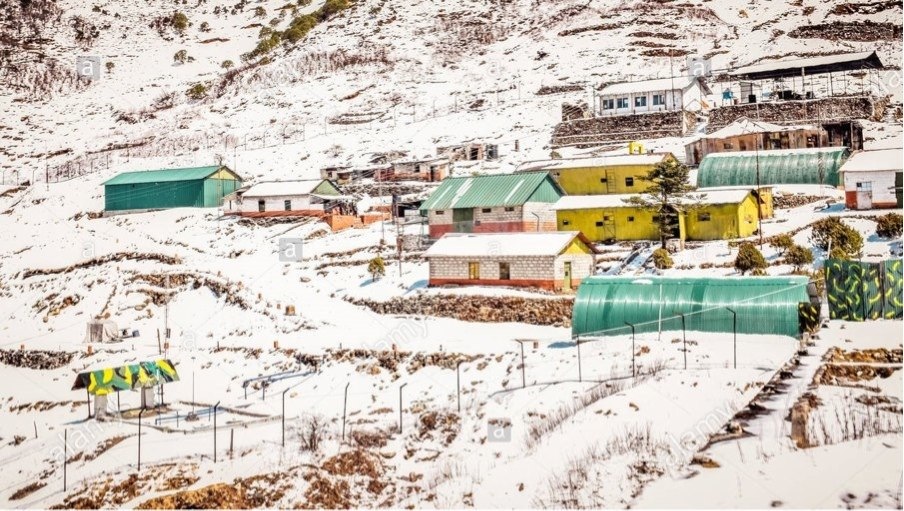
A view of a typical army unit
After conferring with the senior JCO, the line guard on night duty was summoned and questioned, the Duty JCO security check register perused but no clues found. I asked my company subaltern to have all men fall in, after all there could be an insider role else how would the thief know which basha had the rations. Despite almost an hour of debriefing, questioning and motivating the men, there was still no breakthrough. Before long, I had reached a decision point, to report the incident or somehow make good the losses. A formal Inquiry was unlikely to lead to any conclusive findings and would end with summary punishments to men on night guard, most likely hapless soldiers on sentry duty over a dark night, sans any lamps whatsoever, in the harshest climate possible.
Before noon, I had already called the subaltern, who had just seen six lunar months as a commissioned officer, to my office. A spirited guy, his enthusiasm still intact, he agreed that it could be the handiwork of a native running one of those eateries nearby and needed to be trapped. Before long, an operation was hatched (!!) and I handed over my as yet unused Dictaphone to him. The same evening, a young Sepoy approached one of those shops and posing as a soldier proceeding on leave, struck a deal with the owner for purchasing a milk powder tin at discount price next day. My friend reported to me the successful set up of the plan, although he was not sure whether that particular shopkeeper only was our culprit; there was no sure shot way of knowing that.
Tea shop in Ladakh — representative image
Next day, some more resources were pressed into service; a JCO with a motorcycle, a one Ton truck with few men apart from our daring Subaltern on the job. At the appointed hour, I started in my Jeep; sharp at 11 ‘O’ clock the young ‘Sepoy’ was taking delivery of the milk powder tin, obviously with Army markings while the JCO fetched the SHO of local Police Station just in time to witness the unauthorized sale/purchase of Army rations, the guilt doubly proven with the audio recordings of previous evening. The Policeman started doing what Police usually do while agreeing that Army rations should be recovered. Well, the men in the one Ton didn’t need an invitation and the shop was ransacked in no time to fill up half the vehicle with Army rations. A couple of our guys went overboard and loaded even the scooter of Shopkeeper and I had to step in at that point of time. Back in the Unit, stock taking revealed that the recovery did not exactly match the inventory of losses but made up for it adequately in terms of value.
The Commanding Officer returned a couple of days later, he was duly briefed by me and the incident was laid to rest. I put in another 22 years of service before retirement and this may have been an insignificant episode in my career; However, the following dilemmas have continued to disturb me till this day :-
• Was there an insider who went unpunished?
• Was the Shopkeeper penalized enough for trading in Army rations?
• The actual culprit may have gone scot free.
• And lastly, whether I would advise any officer today to take such action?
My personal answer is an emphatic ‘NO’
As I approach the evening of my life, I invite views of my friends, on how such incidents should be tackled, to strike a balance between the exuberance of the youth and wisdom of the old.
*
Opinion of the Editor
Before inviting comments from the readers, it is only fair, that I should offer my personal views on the issue. I have chosen to record them in point form:
-
Theft and burglary are omnipresent, in military as well as civilian life. When I was working with Ashok Leyland, twelve marine engines were ‘stolen’ and the process of recovering them was painful and tortuous.
-
Pilferage occurs all the time, everywhere. When I a young officer, a wise old soldier told me, “Even if an absolutely honest man distributes ‘gangajal’ his hands are bound to get wet!” During my service, I used to turn a Nelson eye towards petty offences.
-
In the high altitudes, the scale of rations is rather generous, and the appetite drops. Surplus gets generated, and officers need to exercise due care, to utilize it properly.
-
The involvement of an ‘insider’ can never be ruled out. But a formal inquiry leads to ‘witch-hunting’ and can lead to an innocent man getting punished.
-
The most sagacious approach is to keep changing personnel who control ‘attractive’ stuffs in the quartermaster stores ant the canteen. And, indeed, there is no substitute to constant vigilance.

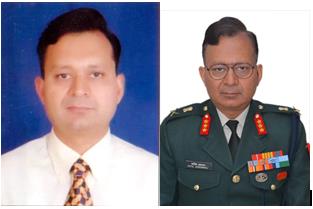
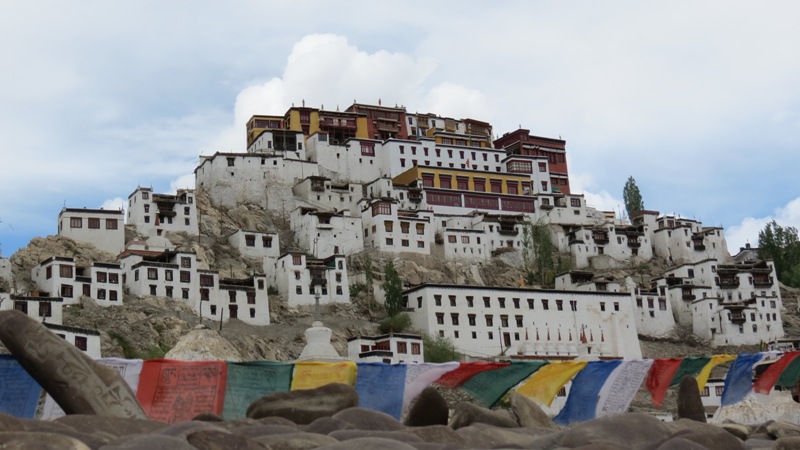

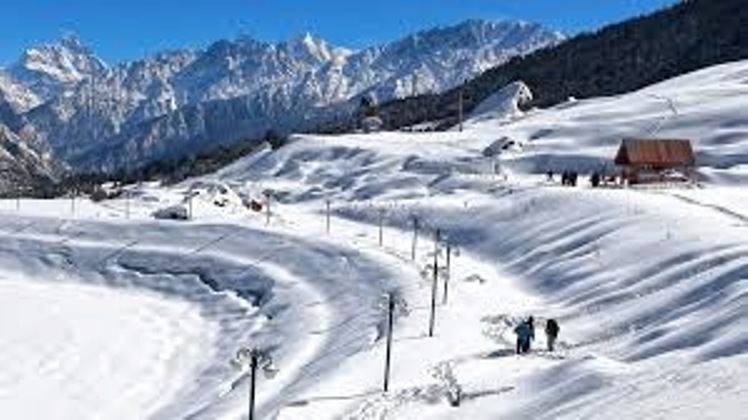
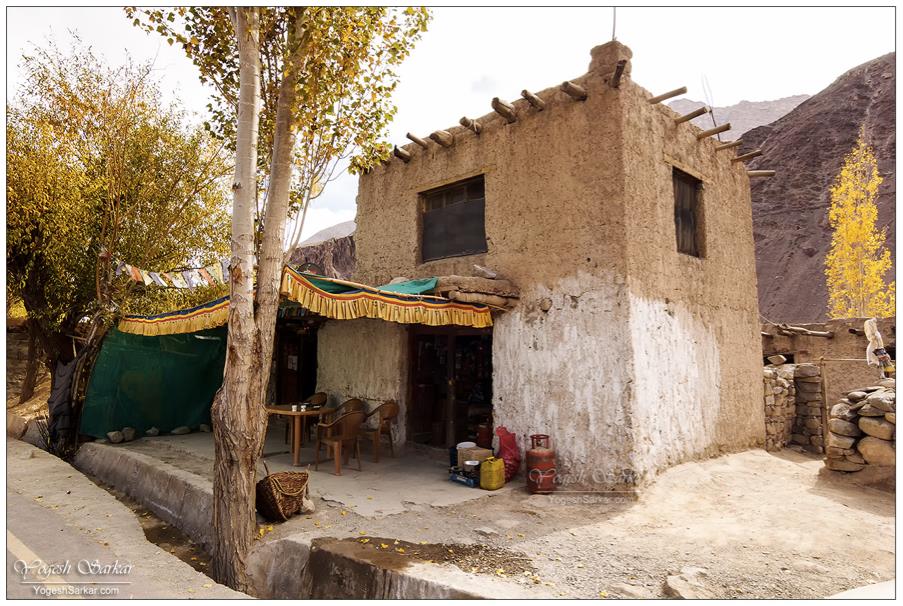




Great write up!
Vividly brings out the travails of Army life.
What I found interesting is the closing line inviting views “….on how such incidents should be tackled, to strike a balance between the exuberance of the youth and wisdom of the old” This seeks to rule out the official Army mandate of holding a C of I in such cases. Of course this is not unusual since in our service all of us have, on various occasions, closed this option basis wisdom and prudence.
Beyond this I think it is largely a question of morality. Which means any action taken by the person in charge loosely fits into the old dictum ‘nothing is right or wrong it is our thinking that makes it so.’
Morality is less objective and mostly subjective by nature. This subjectivism make morality relative…. making moral probity relative to the particular circumstance or individual/in this case an Army unit as long as it is done in good faith. This is clearly the case here.
sir, An interesting situation of offence, VALUE OF LOSS, auth, punishment, OLQ, SUNDRY FACTORS etc.
Once lost goods identified then that much should have been recovered rightly.
Warning to the shopkeeper could have been enough.
By ransacking his shop displays a very poor picture of the people in uniform and more so the Officers 1/c.
Since crime was not pin pointed wrt culpability, (inside job unlikely), that much degree of punishment may have been scaled down since civilian involved
In the END JO HUA ACHHA HUA. KAR BHALLA HO BHALLA.
LUCKY THEY WERE NOT CONTROLLED STORES.
An excellent narration by Lt Gen KK Agarwal. I enjoyed reading the incident. I haven’t been to Leh/Laddakh yet. Now I shall make plans to visit in the near future. Shall visit the scene of theft and then give my remarks
Dear Kapil,
The root cause of the evil is the creation of ‘surplus stores’ and ‘unit funds’
During my service the most painful duty which I had to perform was to sit in the Court Marshal of a Commanding Officer, who had created a ‘CO fund’ and built of a large reserve of ‘fuel for warming and drying’ He was so attached to his command that he never took annual leave, to keep these two things a secret from his second-in-command. Eventually his officers got together and let the cat out of the bag. The highly qualified and ambitious officer received a severe punishment, about forty years ago.
There was a lesson for every one else in the formation.
Surjit
I can only call this an interesting episode and not a Story, as Stories are normally fiction.
Without an iota of doubt, this is an Inside JOB, performed by some one who had full knowledge of the Q M store and the reeoom in which all this stuff had been stored, including the weak spot, WINDOW , thru which he broke in, pilfered and escaped.
Such incidents won’t be uncommon in remote areas, only seldom reported ’cause,
“Aare Bhai, Unit Ka Naam Badnam jo Hota Hai”
Ashutosh Mathur, an EME Veteran
An interesting episode, I won’t call it a story, as stories are normally fiction,
without doubt, it is bound to be an inside JOB, some one who had first hand knowledge of the Q M Store where all these items were stored, including the weak spot, The WINDOW, thru which he could make an entry, pilfer and escape.
Such incidents might be not so uncommon in remote places, but then seldom reported,
“Aare Bhai Unit Ka Naam Badnam Hota Hai”
CHEERS !!!
Ashutosh Mathur, an EME Veteran
Dear Kapil, we have all gone through this dilemma in our service, more so when posted in Leh area. I was posted in Tangtse and later moved to Kiari in 1992-94. At that time, the locals survived on the Army. FOL to rations etc. I had the ASC supply depot next to my unit and often got reports of petty thefts. These incidents were always with the connivance of an insider. Generally, petty thefts were overlooked as long as nobody was making it a profession. Resale of rations in nearby tea shops etc were strictly not encouraged. While retrieving stolen Army goods, our men should be checked not to go overboard as it may spoil our PR with the locals.
Good to see your comments Anupam. I would like to know that with your extensive experience, would you approve of such actions when confronted with a petty theft. If not, then what should have been the line of action?
Thanks.
Nirmal
Let me see, if I can re work on my Pinglish’ again with my hard hitting comment on a very relevant issue which is questioning- our dear General & a v affectionately loving friend’s mind with whom we all are still in touch after he left the big chair!
Subject matter being of importance;
especially, when it can lay some learnings for our young officers of the great Indian Army, I would like to do it for your priceless work,
Confirm, if there is any deadlines?
It can be with you by the mid week
Regards warm and loving- Urs JK
PS:- (little background)
Since my military service started in Leh Ladakh, Darbuk-Chasule immediately after 62 Ops for 2 years after YO’s and later having commanded Unit’s in the well known high Altitudes areas, of Sela- Kela pass
of Arunachal and not forgetting to have maintained Nathula axis and passes around as The Commanding Officer of our prestigious Battalion should have tons of experience to share as to how such little mischiefs are plugged at various levels, irrespective of level of command you are titled as a Captain, Major or Lt Colonel/full Colonel as CO
You can’t forget that I would have unbelievable-unparalleled experience of high altitude rations and equipment pilferages/Losses-
Thefts in such parallel semi civilian organisations where One’ was destined to be Deputy as well as Head of The National Institution for 6 years, two tenures would open eyes of few v senior officers as well
This is where you have and or can create Tons of Dry fruits – attractive consumable goodies as surplus
and you are The Boss with least restrictions or checks on your head!
Insha’Allah!
We will draw a frame work of checks
n balances to remember and to be followed as ‘Musts’ in our charter of duties, when we are in commands
to handle such theft scenarios
Hope; you have not forgotten that
I kick started first 20 years of my beautiful Life in and out side Jails
of Pakistan and Aapna Punjab ;
father being A Jailor Not Funny! Unfortunately it’s 100% True!
Some anecdotes would be interesting
with examples and narrations coming straight from the horse’s mouth-the prisoners who were my friends, coz they knew my Dad is the Man/Jailor!
With a stick in hand and Hat Pith Sola
on The Head
Pleasing little JK would be pleasing The Man for Favours !
Dear ‘Babbar Sher’
No one has spent more time in the high altitudes than you. And your adventurous journey to the South Pole is a milestone was a truly historic and heroic act.
Why not share a story with us?
Regards to Lalit and the young ladies.
Surjit
Dear JK Sir, Thx for taking out time to again post your “disappeared response”. You have commanded institutes of national importance in HAA, I would be eager to know how you have handled thefts of this kind.
There is one more question that haunts me.
Why do units build such large amounts of ‘surplus’ rations? I can understand the need of a reserve, to cater for a failure of the supply chain. And for that the army resorts to ‘winter stocking’
If a surplus is created we used to either donate the surplus to a religious institution of hold a ‘bhandara’ .
Food of theought (literally about food!
Surjit
Read with interest the story . Also read the Comments of Thomas ( NDA 3007 Self 3000 ), Dave Sood ( School mate Harcourt Butler School) and Brig Hari Kumar ( colleague at KEANE ). Small world.
I could relate it well as I had served in LEH besides at KARU and KIARI , about 30-40 KM from LEH. But that was way back in 1964. LEH has changed a lot .
Talking of stealing Rations , reminds me of WALNUTS , which was part of high Alt Ration. Rumour doing the round was Walnuts make a person Impotent. Thus there were no takers and bags full of walnuts used to lie surplus . And some of it found its way to neighbouring Civilians ( cant say at what consideration ) .
Cheers to everyone.
An interesting episode. What action Shri Kapil Aggarwal took is to be appreciated. A substantial quantum of stolen goods were recovered whose value was certainly more than the value of goods lost. Why rake up an enquiry and demoralise our troops at the border. Is it not an act of bravery that they are guarding our frontiers against all offs even at temperatures more than minus 20 degree centigrade? What’s the guarantee that the enquiry would yield tangible results and the actual culprit would be caught? The conduct of the army is way above that of civilians as far as honesty is concerned. There is inherently nothing wrong in what Shri Kapil Aggarwal did.
Kudos.
I agree 100 % with your views Though I was not a service person , I had the
opportunity to visit twice during my service in DGQA to Ladhak for certain winter trials. The treatment to civilians by the trial unit was exemplary.Totally opposite was the climate.To leave & work under such conditions is very very difficult. AS a civilian. I feel that somebody can do such pilferage just for amusement also. You took right decision Sir.
Will wait for your GLASS HUT VERSION SIR RGDS
Here we have snow 6 months all houses are left with
NO security
except some one rings up 911 when ever
Police come within seconds
how need to research it.
ME /YOU
colls
Dear Sergeant Major
Thy word is my command!
Surjit
Raj Mehta
to me
Thanks for sharing. Interesting episode.
Regards and best wishes
Raj
Ashok K Chordia
to me
Dear General,
Thank you for sharing the story. I have posted my thoughts on the blog.
Regards.
satish bhandari
to me
A very nice story
Satish
JK Bajaj
to J, me
G’mg big Chief
I wrote my comments this morning
Don’t see them?
How did these disappear once I clicked submit??
Regards- JK
amarklair K
to me
Dear Surjit Uncleji,
Thank you for sharing such an intriguing story about Leh, a place where I did have a chance to visit and stay as a guest under the CO of the Unit in 1995.
I could picture the story in my mind… and that made it more gripping.
Best,
- Amarjeet Kaur
I have never been posted to Leh, but have visited that area a few times. Just before retiring from the army in June 1997, I went there in March or April 97. I stayed in the captioned unit and received unfathomable affection from every one whom I met.
I am glad to mention that no one spoke about the above incident. It is apparent that the issue had been resolved to the entire satisfaction of all the stake holders.
I will some day write about their glass hut and the scenic beauty of the place. The monasteries and Gurudwara Pathar Sahib add a spiritual touch to the place.
And indeed, quiet flows the river Indus, unlike the Teesta which gurgles and roars in Sikkim, where I commanded a unit in 1981-83 with Harikumar.
Surjit
Simple story with so many lessons to learn.
Well handled . No damage to the Government property.
In my short life in the Army; we never involved the Police. Police was a big NO NO.
Your sage advice at the end is the best part of the story.
enjoyed it.
The story took me back down memory lane to 1967 when I was stationed at Kargil as OIC AWD of 2 Task Force Wksp EME supporting Project Beacon ,DGBR . Our jurisdiction was Sonamarg to Leh .High altitude rations were plenty and never consumed in full . The accounting of ration or any other items back then was not strictly followed and there was no auditing . From the story , I presume there could have been an insider – could be the store in charge himself ,trying to make quick money as a theft by civilians from outside is not very easy. The local search and follow up actions described are probably in the correct lines. Such cases need Police way of action and not any formal C of I. The action has deterrent effect as confiscation of items with military markings will expose the civilian vendor to criminal liability .
Thank you Sir for your views. The action surely may have resulted in a deterrent effect on the local shopkeepers, even though temporary. However, the Insider issue was an extremely tough nut to crack. Those days any JCO/OR proceeding on leave for 20 days or more used to to return to unit after a minimum gap of two months (sometimes three months), there being no chartered flights for men like today. It automatically entailed quick turnover of personnel in key appointments Thus, at any given time, there used to be many men in the unit who have been in the QM store at one time or another. Solving the theft with much higher number of suspects is tough as cpmpared to situation when there are only 2/3 suspects.
An interesting yet not an uncommon dilemma. I have spent fair time in the region (Leh, Stakna, Tso Kar, Nyoma…) doing some high altitude jump trials in the eighties. Units do have surplus rations, in the High Altitudes in particular. And, with the tacit approvals of the ‘higher ups’ these are sometimes ‘donated’ to the local folks as a goodwill gesture or are ‘bartered’ for a favour for the collective good of the men. There are times when people exploit such ‘gestures’ for personal gains. It is not impossible to reach the bottom of such cases (goodwill gesture gone awry, actual theft etc). Generally, the apprehension of skeletons tumbling out, prevents one from scratching the surface. So institutionalised are the processes that one would not want to ‘disturb’ anything. Dear General, the one question that came to my mind after reading your story was: “Wasn’t the shop keeper questioned on how he got those service rations?” I wonder if that would have led to some embarrassing answers leading to further dilemma on follow up action. My Take: One at the helm must dare and go to the root of the matter and take a call on whether to condone the action of well-meaning individuals or to punish the culprits, if any. It would be unfair to speculate, but in this case, to me it appears that there was an effort on someone’s part to cover up discrepancies that might have accrued over a period of time.
Thanks to Gen Kapil Aggareal for this story.
Was privileged to spend the full month of September 1962 in this very spot. Of course, it was sparsely populated at that time. And the Indus valley had very few trees.
I was on a fortnight’s duty but the weather packed up and my stay was extended by another fortnight. Our rations ran out and we subsisted on pooris and tinned tinda.
Leh is a cold desert. Based on available records, the engineers had insulated our wooden huts with mud. The weather Gods had different ideas and we got continuous rain and snow. This soaked the mud on our roofs and they started dripping mud. Whether it was the dining hut or our bedroom, it dripped and dripped.
And the border situation was tense with fighting going on in the Namka Chu area of Arunachal. In Ladakh, we had the Galwan incident.
Another point of interest is that the take off path was over the gompa hill, though not the gompa itself. Presumably with the permission of the gompa priests, there was a lengthy project to reduce the height of one half of the gompa hill. Obviously, no explosives could be used.
The video shows how much progress has been made.
Altogether, one of my favourite places. Solley lama ! Solley lama ! Solley !